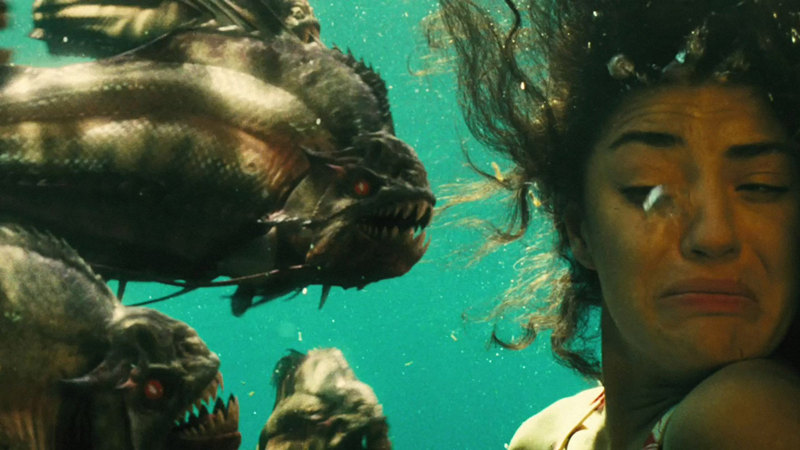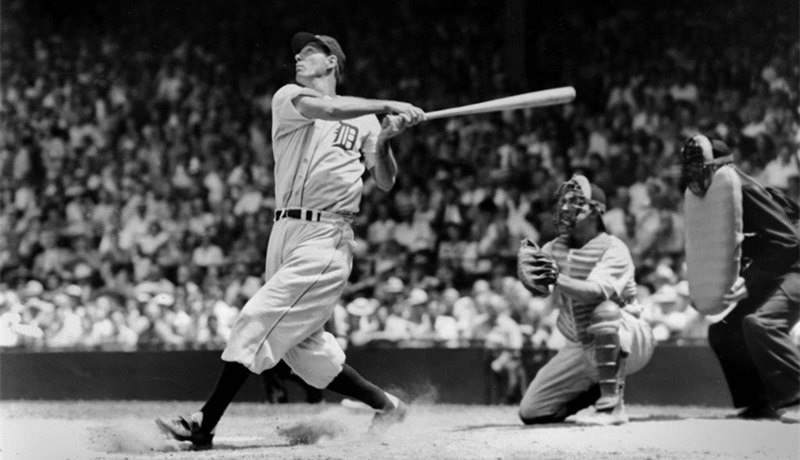Jubal Troop is one heck of a name for a Western character, isn’t it? It’s the kind of name you can spit right into a cuspidor from clear across the room. Credit goes to novelist Paul I. Wellman, but it’s one of the many touches that make this humble genre entry by director Delmer Daves so enjoyable.
Daves and co-screenwriter Russell S. Hughes adapted just one part of Wellman’s colorful epic, dropping the historical sweep for a focused character study of a good man running from bad memories. The wandering Jubal Troop (Glenn Ford) literally stumbles into a cattle ranch run by the high-spirited Shep Horgan who looks an awful lot like Ernest Borgnine, and if there’s one thing I’ve learned about movies, it’s that anyone who looks even a little bit like Ernest Borgnine is always Ernest Borgnine.
Shep almost instantly adopts the hard-working young hunk (while you’re watching, try to believe that Borgnine was a year younger than Ford) and Jubal returns the affection, seeing Shep as the father figure who was stolen from him at a young age. The normally taciturn Jubal reveals his personal tragedy in a surprisingly frank moment that confirms his status as a walking open wound. “Bad luck, I carry it with me” is Jubal’s motto, but he gradually admits the possibility of hope and even entertains the thought that he might have a new home.
But there are serpents in his new Eden. First, there’s the chronically bitchy cowboy Pinky (Rod Steiger) who’s only mean on days that end in -day. But far more menacing is the looming specter of Shep’s wife Mae (Valerie French), a knockout French-Canadian filly Shep roped on a trip to Calgary. Any gal would be swept off her feet by a man who looks like Ernest Borgnine, but its turns out her American Dream has not been fulfilled on a ranch that’s just “10,000 acres of lonesomeness.” Mae trains her eye on Jubal from their first meeting and builds a rich fantasy life in which Jubal is equally smitten with her but denies his earthly desires out of misguided loyalty. The fact that Jubal, fundamentally repulsed by the thought of a woman who would cheat on her husband, couldn’t be less interested doesn’t dissuade her in the least. Jubal doesn’t budge, and never will. But all it takes is an ill-placed rumor for all hell to break loose.
“Jubal” (1956) was filmed in Wyoming with the Grand Tetons as a constant background providing the film’s most tangible evidence of a divine presence. Perhaps cinematographer Charles Lawton Jr. didn’t have to work to hard to bring the streams and forests and snow-capped peaks to supernal life, but he and Daves show off the breathtaking vistas whenever possible. It’s just the kind of beautiful world where a man in need of a miracle might find one, and the kind that can be despoiled a few acts of venality.
Borgnine is as charismatic and eminently likeable as he’s ever been, and that’s saying a heck of a lot. The absurdly handsome Ford is equally sympathetic while performing in a much quieter register. Steiger, fully engorged with the Method and fresh off the waterfront, sticks out from the rest, delivering every line at maximum intensity, a constant baying at the moon that’s definitely off-key, but somehow makes sense since Pinky just plain old doesn’t belong with everyone else in the valley.
The Shakespearean tragic arc is a very familiar one, but what the film lacks in dramatic surprises, it more than delivers in quality craftsmanship, though I suspect that description underplays the film’s poetic flourishes. As Kent Jones argues persuasively in the accompanying booklet essay, Daves was a genuine artist who crossed genres but was never more comfortable than when using the mythic West as his canvas. “Jubal” might not be as celebrated as some of his other work, but it’s the vision of this artist that makes it something special.
Oh yeah, and Charles Bronson’s in it too.
Video:
The film is presented in its original 2.55:1 CinemaScope ratio. The Technicolor hues are rich, though not bursting off the screen like some of Criterion’s recent high-def Technicolor transfers. Overall, this 1080p transfer is fairly strong, but it seems like there’s just something lacking in terms of overall visual acuity. There are a few scenes that look a little soft, slightly distorted and just not as sharp in image detail as other Criterion high-def transfers. The natural vistas still look gorgeous, however.
Audio:
The LPCM 2.0 soundtrack is crisp and does justice to the sometimes-booming score by composer David Raksin. Otherwise it’s more functional than dynamic, but no complaints. Optional English subtitles support the English audio.
Extras:
This is a bare-bones offering. However, the 16-page insert booklet includes an excellent appreciative essay by critic Kent Jones who provides context for Daves’s career as well as analysis of “Jubal.”
Film Value:
Criterion has released two Westerns by Delmer Daves this week. “3:10 To Yuma” (1957) is the more celebrated and I won’t argue that it’s not the better film as well, but Criterion has provided a double shot of Daves for a reason. Kent Jones writes essays for both films intending to bolster Daves’s case as an auteur worthy of the attention he hasn’t gotten, and “Jubal” is both entertaining in its own right as well as an excellent companion piece to “Yuma.” Some extras would have been nice, but this film makes a fine addition to the Criterion Collection.


